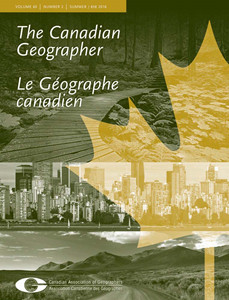Publications
Privacy • Place • GIScience
2024
-
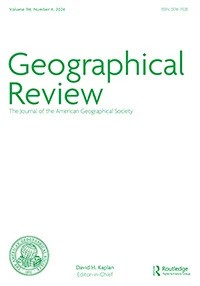 Geoprivacy knowledge, attitudes, and behaviors in contemporary ChinaH. Zhang, and G. McKenzieGeographical Review, 2024
Geoprivacy knowledge, attitudes, and behaviors in contemporary ChinaH. Zhang, and G. McKenzieGeographical Review, 2024China has an Internet penetration rate of over 70 percent and a massive user base of social media. However, the topic of privacy attitudes among Chinese individuals remains understudied. We analyzed geoprivacy concerns in China through an online survey and regression analysis. Our findings suggest a positive relation among privacy knowledge, attitude, and behavior, consistent with related literature. Declarative knowledge (such as privacy rights), on the other hand, was found to have a negative relation with privacy concerns, which has not been reported previously. In terms of demographic moderators, females had less privacy knowledge but more privacy protection behaviors, while the impact of age on privacy concerns was inconclusive. A notable discovery was the regional difference in privacy concerns within China, suggesting the potential geopolitical influence on individuals’ values and beliefs. Combined with the uncovering of behavioral change in response to involuntary location disclosure, the results of this article challenge the conventional notion that Chinese individuals are indifferent to their online privacy, thus reintroducing an underexplored perspective from the Global South into geoprivacy studies.
@article{zhang2024geoprivacyKAB, author = {Zhang, H. and McKenzie, G.}, year = {2024}, title = {Geoprivacy knowledge, attitudes, and behaviors in contemporary China}, journal = {Geographical Review}, doi = {10.1080/00167428.2024.2422873}, } -
 Place-based privacy: Understanding attitudes and behaviours across China and beyondH. ZhangMcGill University, 2024
Place-based privacy: Understanding attitudes and behaviours across China and beyondH. ZhangMcGill University, 2024The emergence of the World Wide Web has eroded traditional boundaries, connecting individuals globally while giving rise to intricate privacy concerns. Within this context, the concept of geoprivacy takes centre stage, highlighting the control of personal location information flow and is influenced by dynamic factors such as time, culture, demographics, and trust. This dissertation posits geoprivacy as a social form that underpins fundamental aspects of social interaction rather than a unilateral desire for isolation from society. The need for location sharing by individuals necessitates a rehumanized, context-dependent exploration, as cultural norms and personal characteristics can lead to varying levels of geoprivacy expectations. Therefore, a human-centred approach is adopted to investigate user responses to regulatory mandates and probe geoprivacy concerns within China and beyond. The first manuscript clarifies the uniqueness of geoprivacy, establishing a humanistic perspective to counteract the dehumanizing effects of datafication and recognize the spatial variations of geoprivacy attitudes. The subsequent manuscript dismantles the ethnocentric view of geoprivacy. Through the analysis of social media data, the study unveils the specific landscape of geoprivacy attitudes within the Confucian realm and reiterates the importance of cultural distinctions in privacy studies. The third manuscript takes a step further by re-examining the relationship between knowledge, attitude, and behaviour, providing deeper contextual insights into understanding geoprivacy behaviours in computer-mediated environments. By employing data collected from an online survey, the study discovers gender disparities and regional divergences in the cognitive perspective of geoprivacy. In its entirety, the dissertation synthesizes these contexts into place-based privacy, wherein geographical information becomes a pivotal determinant and extension of an individual’s privacy attitudes. As both a humanistic and social concept, geoprivacy transcends mere degrees of anonymity in data disclosure. The empirical studies in this dissertation showcase the varying nature of geoprivacy perceptions even within the Chinese regions. These findings ultimately enrich the dialogue surrounding privacy, technology, and society, transforming geoprivacy from a self-reinforcing cycle of universal values into a diverse concept embraced by a broader population.
@thesis{zhang2024place, author = {Zhang, H.}, year = {2024}, title = {Place-based privacy: Understanding attitudes and behaviours across China and beyond}, school = {McGill University}, }
2023
-
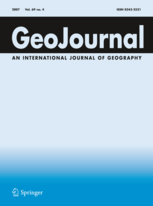 Rehumanize geoprivacy: From disclosure control to human perceptionH. Zhang, and G. McKenzieGeoJournal, 2023
Rehumanize geoprivacy: From disclosure control to human perceptionH. Zhang, and G. McKenzieGeoJournal, 2023Traditional boundaries between people are vanishing due to the rise of Internet of Things technology. Our smart devices keep us connected to the world, but also monitor our daily lives through an unprecedented amount data collection. As a result, defining privacy has become more complicated. Individuals want to leverage new technology (e.g., making friends through sharing private experiences) and also avoid unwanted consequences (e.g., targeted advertising). In the age of ubiquitous digital content, geoprivacy is unique because concerns in this area are constantly changing and context-dependent. Multiple factors influence people’s location disclosure decisions, including time, culture, demographics, spatial granularity, and trust. Existing research primarily focuses on the computational efforts of protecting geoprivacy, while the variation of geoprivacy perceptions has yet to receive adequate attention in the data science literature. In this work, we explore geoprivacy from a cognate-based perspective and tackle our changing perception of the concept from multiple angles. Our objectives are to rehumanize this field from contextual, cultural, and economic dimensions and highlight the uniqueness of geodata under the broad topic of privacy. It is essential that we understand the spatial variations of geoprivacy perceptions in the era of big data. Masking geographic coordinates can no longer fully anonymize spatial data, and targeted geoprivacy protection needs to be further investigated to improve user experience.
@article{zhang2023rehumanize, author = {Zhang, H. and McKenzie, G.}, year = {2023}, title = {Rehumanize geoprivacy: From disclosure control to human perception}, journal = {GeoJournal}, volume = {88}, number = {1}, pages = {189--208}, doi = {10.1007/s10708-022-10598-4}, } -
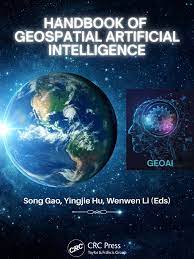 Privacy and ethics in GeoAIG. McKenzie, H. Zhang, and S. GambsIn Handbook of Geospatial Artificial Intelligence, 2023
Privacy and ethics in GeoAIG. McKenzie, H. Zhang, and S. GambsIn Handbook of Geospatial Artificial Intelligence, 2023Any advancement in technology is accompanied by new concerns over its ethical use and impacts on privacy. While a notoriously difficult term to define, privacy as it relates to technology usage, can be described as the ability of an individual or group to control their personal information. Like many ethical concepts, this definition evolves with changes in societal and technical norms. The emergence of machine learning and related artificial intelligence techniques has again shifted societal concerns about the privacy of our persons, socio-demographic group membership, and personal data. Location data are particularly sensitive as they link information across sources and can be used to infer a wide variety of personal information. This makes data privacy one of the most important ethical discussions within the field of geographic artificial intelligence (GeoAI). The main objective of this chapter is to explore the unique privacy concerns associated with AI techniques used for analyzing geospatial information. After providing an overview of the topic, we describe some of the most common techniques and leading application areas through which data privacy and GeoAI are converging. Finally, we suggest a number of ways that privacy within GeoAI can improve and highlight emerging topics within the field.
@incollection{mckenzie2023privacyethics, author = {McKenzie, G. and Zhang, H. and Gambs, S.}, year = {2023}, title = {Privacy and ethics in GeoAI}, booktitle = {Handbook of Geospatial Artificial Intelligence}, editor = {Gao, S. and Hu, Y. and Li, W.}, publisher = {CRC Press}, } - GIScience’23Platial k-anonymity: Improving location anonymity through temporal popularity signaturesG. McKenzie, and H. ZhangIn The 12th International Conference on Geographic Information Science, 2023
While it is increasingly necessary in today’s digital society, sharing personal location information comes at a cost. Sharing one’s precise place of interest, e.g., Compass Coffee, enables a range of location-based services, but substantially reduces the individual’s privacy. Methods have been developed to obfuscate and anonymize location data while still maintaining a degree of utility. One such approach, spatial k-anonymity, aims to ensure an individual’s level of anonymity by reporting their location as a set of k potential locations rather than their actual location alone. Larger values of k increase spatial anonymity while decreasing the utility of the location information. Typical examples of spatial k-anonymized datasets present elements as simple geographic points with no attributes or contextual information. In this work, we demonstrate that the addition of publicly available contextual data can significantly reduce the anonymity of a k-anonymized dataset. Through the analysis of place type temporal visitation patterns, hours of operation, and popularity values, one’s anonymity can be decreased by more than 50 percent. We propose a platial k-anonymity approach that leverages a combination of temporal popularity signatures and reports the amount that k must increase in order to maintain a certain level of anonymity. Finally, a method for reporting platial k-anonymous regions is presented and the implications of our methods are discussed.
@inproceedings{mckenzie2023platialkanonymity, author = {McKenzie, G. and Zhang, H.}, year = {2023}, title = {Platial k-anonymity: Improving location anonymity through temporal popularity signatures}, booktitle = {The 12th International Conference on Geographic Information Science}, doi = {10.4230/LIPIcs.GIScience.2023.9}, } - SKI’23Place-based privacy: A humanistic reflection on solitude and anonymityH. ZhangIn The 8th Conference on Spatial Knowledge and Information Canada, 2023
The need for privacy has long existed before the realization of modern society. Online privacy researchers seem to be surrounded by digital technologies and try creating universal privacy standards and design philosophies to help users stay anonymous. Based on Yi-Fu Tuan’s interpretation of humanistic geography, this article extends the concept of place-based privacy following an ethological perspective. A research agenda is presented in the area of geographical knowledge, territory and place, and crowding and privacy by analyzing the relationship between human, privacy, and place. The article concludes by explaining the usefulness of studying place-based privacy.
@inproceedings{zhang2023placebasedprivacy, author = {Zhang, H.}, year = {2023}, title = {Place-based privacy: A humanistic reflection on solitude and anonymity}, booktitle = {The 8th Conference on Spatial Knowledge and Information Canada}, doi = {10.17605/OSF.IO/N6DU5}, }
2022
-
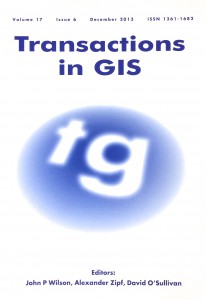 PrivyTo: A privacy‐preserving location‐sharing platformG. McKenzie, D. Romm, H. Zhang, and 1 more authorTransactions in GIS, 2022
PrivyTo: A privacy‐preserving location‐sharing platformG. McKenzie, D. Romm, H. Zhang, and 1 more authorTransactions in GIS, 2022Concern over the privacy of our personal location is at an all-time high, yet the desire to share our lives with friends, family, and the public persists. Current methods and applications for sharing location content with the range of people in our lives are sorely lacking. Application users are often limited to sharing a single spatial resolution with all individuals, regardless of relation, and with little control over how this content is shared. Processes for sharing typically involve allowing a for-profit company access to one’s location before it can be transmitted to the intended recipient. In this work we propose a set of design goals and a design pattern for sharing personal location information that are realized through a prototype mobile web application. Our approach is built on the novel idea of obfuscated and encrypted location views, and promotes a uniquely open method for sharing. The intention of this article is to demonstrate that location sharing need not require one to expose private location information to third parties, and that methods exist to put an individual back in control of their content.
@article{mckenzie2022privyto, author = {McKenzie, G. and Romm, D. and Zhang, H. and Brunila, M.}, year = {2022}, title = {PrivyTo: A privacy‐preserving location‐sharing platform}, journal = {Transactions in GIS}, volume = {26}, number = {4}, pages = {1703--1717}, doi = {10.1111/tgis.12924}, } - ISTAS’22Towards place-based privacy: Challenges and opportunities in the “smart” worldH. Zhang, and G. McKenzieIn IEEE International Symposium on Technology and Society, 2022
The emergence of "smart" technologies has given rise to new interaction models merging our physical realities with our digital environments. As a result, new privacy threats have emerged, substantially impacting both individuals and groups. In this short paper, we summarize many of the privacy challenges we face in the smart and connected world, and identify opportunities for further research. Drawing from the recent literature on geoprivacy, user-tailored privacy, and group privacy, we explore this topic through the lens of contextually aware, place-based, or platial, information analysis.
@inproceedings{zhang2022towardsplacebasedprivacy, author = {Zhang, H. and McKenzie, G.}, year = {2022}, title = {Towards place-based privacy: Challenges and opportunities in the ``smart'' world}, booktitle = {IEEE International Symposium on Technology and Society}, doi = {10.1109/ISTAS55053.2022.10227114}, } - PLATIAL’21Report from the first workshop on cyber ethics in platial researchH. Zhang, G. McKenzie, M. Tomko, and 2 more authorsIn Proceedings of the 3rd International Symposium on Platial Information Science, 2022
On December 15th, 2021, the First Workshop on Cyber Ethics in Platial Research was held in Enschede, the Netherlands (virtually), in conjunction with the Third International Symposium on Platial Information Science (PLATIAL’21). The objective of this workshop was to explore the unique aspects of ethics related to place. During the workshop, invited speakers first provided a summary of their related work followed by organizers and attendees discussing the topic more broadly. With the goal of spurring an active discussion, the organizers prompted discussion through proposing the following three questions to the speakers and workshop attendees.
@inproceedings{zhang2022workshopcyberethics, author = {Zhang, H. and McKenzie, G. and Tomko, M. and Egorova, E. and Kim, J.}, year = {2022}, title = {Report from the first workshop on cyber ethics in platial research}, booktitle = {Proceedings of the 3rd International Symposium on Platial Information Science}, pages = {87--92}, doi = {10.5281/zenodo.6413003}, } -

- AAG’23A spatial-temporal public opinion analysis of IP location disclosure on Chinese social media platforms using Weibo dataH. Zhang, and G. McKenziePreprint, 2022
On April 28, 2022, the Chinese social media platform, Weibo implemented a new feature that automatically adds a user’s location (determined by IP addresses) to all posts and comments. In this work, we analyze users’ reactions to this implementation. Exploratory spatial-temporal analysis was conducted on a wide range of content with the goal of understanding the general trends and major themes of the discussion. A Latent Dirichlet Allocation (LDA) topic model was used to extract implicit topics from the discourse. Results indicate that both supporters and opponents of the mandatory location disclosure participated in the discussion, with females more involved than males. Location privacy concerns were also interpreted through hashtags and LDA-derived topics, and the variation between local and overseas Chinese opinions was compared. The findings of this study will aid policymakers in understanding public concerns about mandatory location disclosure and help developers implement privacy-aware designs in the context of contemporary China.
2021
- SDSS’21“Data horror”: Mapping (spatial) data privacy violations onto a cognitive account of horrorD. Romm, H. Zhang, P. Verma, and 2 more authorsIn Spatial Data Science Symposium, 2021
While spatial data privacy is not a new concern, recent informationtechnology developments that allow for the increased collection and alternativeuse of spatial data have brought the discussion about geoprivacy back in focus.In this work we draw a parallel between a conceptualization of horror based onwork from cognitive scientists and philosophers, and the intrusiveness of currentdata collection methods, the unauthorized use of this data, and the transgressionsmade by data stewards. By drawing this connection, we discuss the familiar topicof data privacy through a novel and jarring lens that clarifies the importance ofdata privacy and elucidates the particular importance of geoprivacy.
@inproceedings{romm2021datahorror, author = {Romm, D. and Zhang, H. and Verma, P. and McKenzie, G. and Chen, E.}, year = {2021}, title = {``Data horror'': Mapping (spatial) data privacy violations onto a cognitive account of horror}, booktitle = {Spatial Data Science Symposium}, doi = {10.25436/E23S3T}, }
2020
-
 With coronavirus containment efforts, what are the privacy rights of patients?H. ZhangThe Conversation, 2020
With coronavirus containment efforts, what are the privacy rights of patients?H. ZhangThe Conversation, 2020 -
 How to pick the right Canadian grad school: A geomatics perspectiveH. ZhangGoGeomatics Canada, 2020
How to pick the right Canadian grad school: A geomatics perspectiveH. ZhangGoGeomatics Canada, 2020
2019
-
 Should governments help PhDs get jobs? No. PhDs must be aware of employment realityH. ZhangToronto Star, 2019
Should governments help PhDs get jobs? No. PhDs must be aware of employment realityH. ZhangToronto Star, 2019
2018
- IJGERAccuracy evaluation of the Canadian OpenStreetMap road networksH. Zhang, and J. MalczewskiInternational Journal of Geospatial and Environmental Research, 2018
Volunteered geographic information (VGI) has been applied in many fields such as participatory planning, humanitarian relief and crisis management. One of the reasons for popularity of VGI is its cost-effectiveness. However, the coverage and accuracy of VGI cannot be guaranteed. The issue of geospatial data quality in the OpenStreetMap (OSM) project has become a trending research topic because of the large size of the dataset and the multiple channels of data access. This paper focuses on a national study of the Canadian OSM road network data for the assessment of completeness, positional accuracy, attribute accuracy, semantic accuracy and lineage. The OSM road networks in Canada have generally reliable quality compared to Digital Mapping Technologies Inc. Urban areas and footways received more contributions than rural areas and motorways, and imported road segments from GeoBase have slightly better quality than the national OSM dataset. The findings of the map quality can potentially guide cartographic product selection for interested parties and offer a better understanding of future improvement of OSM quality. In addition, the study presents the OSM contributions influenced by data import and remote mapping.
@article{zhang2018accuracy, author = {Zhang, H. and Malczewski, J.}, year = {2018}, title = {Accuracy evaluation of the Canadian OpenStreetMap road networks}, journal = {International Journal of Geospatial and Environmental Research}, volume = {5}, number = {2}, pages = {1}, url = {https://dc.uwm.edu/ijger/vol5/iss2/1}, }
2017
-
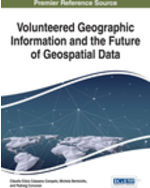 Quality evaluation of volunteered geographic information: The case of OpenStreetMapH. Zhang, and J. MalczewskiIn Volunteered Geographic Information and the Future of Geospatial Data, 2017
Quality evaluation of volunteered geographic information: The case of OpenStreetMapH. Zhang, and J. MalczewskiIn Volunteered Geographic Information and the Future of Geospatial Data, 2017A large amount of crowd-sourced geospatial data have been created in recent years due to the interactivity of Web 2.0 and the availability of Global Positioning System (GPS). This geo-information is typically referred to as volunteered geographic information (VGI). OpenStreetMap (OSM) is a popular VGI platform that allows users to create or edit maps using GPS-enabled devices or aerial imageries. The issue of quality of geo-information generated by OSM has become a trending research topic because of the large size of the dataset and the inapplicability of Linus’ Law in a geospatial context. This chapter systematically reviews the quality evaluation process of OSM, and demonstrates a case study of London, Canada for the assessment of completeness, positional accuracy and attribute accuracy. The findings of the quality evaluation can potentially serve as a guide of cartographic product selection and provide a better understanding of the development of OSM quality over geographic space and time.
@incollection{zhang2017qualityevaluation, author = {Zhang, H. and Malczewski, J.}, year = {2017}, title = {Quality evaluation of volunteered geographic information: The case of OpenStreetMap}, booktitle = {Volunteered Geographic Information and the Future of Geospatial Data}, editor = {Campelo, C. and Bertolotto, M. and Corcoran, P.}, pages = {19--46}, publisher = {IGI Global}, doi = {10.4018/978-1-5225-2446-5.ch002}, } -
 Quality assessment of the Canadian OpenStreetMap road networksH. ZhangWestern University, 2017
Quality assessment of the Canadian OpenStreetMap road networksH. ZhangWestern University, 2017Volunteered geographic information (VGI) has been applied in many fields such as participatory planning, humanitarian relief and crisis management because of its cost-effectiveness. However, coverage and accuracy of VGI cannot be guaranteed. OpenStreetMap (OSM) is a popular VGI platform that allows users to create or edit maps using GPS-enabled devices or aerial imageries. The issue of geospatial data quality in OSM has become a trending research topic because of the large size of the dataset and the multiple channels of data access. The objective of this study is to examine the overall reliability of the Canadian OSM data. A systematic review is first presented to provide details on the quality evaluation process of OSM. A case study of London, Ontario is followed as an experimental analysis of completeness, positional accuracy and attribute accuracy of the OSM street networks. Next, a national study of the Canadian OSM data assesses the overall semantic accuracy and lineage in addition to the quality measures mentioned above. Results of the quality evaluation are compared with associated OSM provenance metadata to examine potential correlations. The Canadian OSM road networks were found to have comparable accuracy with the tested commercial database (DMTI). Although statistical analysis suggests that there are no significant relations between OSM accuracy and its editing history, the study presents the complex processes behind OSM contributions possibly influenced by data import and remote mapping. The findings of this thesis can potentially guide cartographic product selection for interested parties and offer a better understanding of future quality improvement in OSM.
@thesis{zhang2017qualityassessment, author = {Zhang, H.}, year = {2017}, title = {Quality assessment of the Canadian OpenStreetMap road networks}, school = {Western University}, }
